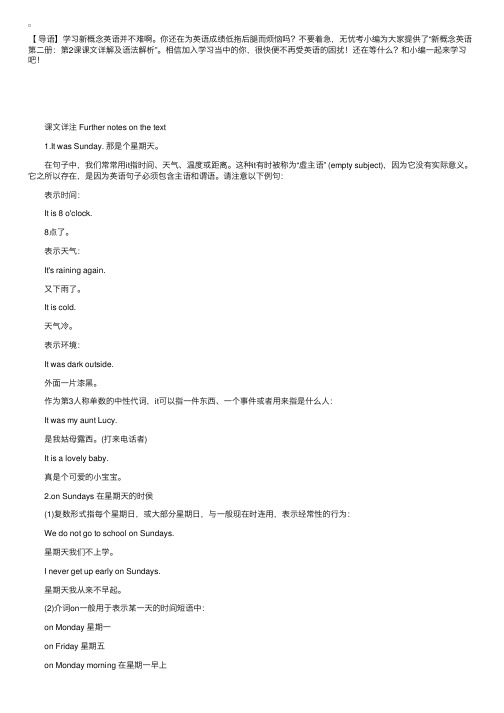新概念二第二课-感叹句
- 格式:ppt
- 大小:11.16 MB
- 文档页数:42

Lesson 1简单陈述句的语序1)句子种类:按句子结构分为简单句、并列句、复合句2)句子成分:主语、谓语、宾语、定语、状语、补语、表语3)简单句的基本成分和语序:参考教材第14页的表格和练习一、重要句型或语法Lesson 21、时态复习1)一般现在时,如:I never get up early on Sundays.2)现在进行时,如:I'm still having breakfast.2、感叹句1)由what引导的感叹句,强调名词,如:What a hot day!2)由how引导的感叹句,强调形容词或副词,如:How hot it is today! / How fast he runs!Lesson 31、时态复习一般过去时,表示过去发生的事情,如:The driver of that car hit that post over there.2、双宾动词1)双宾动词是指某些动词后面可以跟两个宾语,表物的为直接宾语,表人的为间接宾语。
2)注意区分双宾动词后间接宾语前用to还是for的区别,一般表示动作对某人而做用to,表示动作为某人而做用for。
如:He passed the salt to me. / She bought the tie for me.Lesson 4时态复习现在完成时,表示过去发生的事情对现在造成的影响或结果,如:I have seen the film.该句可能暗含的潜台词是:我对这部电影的情节比较了解了或者我不愿意再看这部电影了。
1)标志性词语:already/just/yet/never/ever2)常见时间状语:recently/lately;in the past/latest+一段时间;up to now/so far3)have been to(去过已回)与have gone to(去了未回)的区别4)瞬间动词(可用于完成时,但不能与一段时间连用)与持续动词的区别5)since(+具体时间/时间点)与for(+一段时间/时间段)的区别Lesson 51、时态复习1)一般过去时,表示过去发生的动作或状态,如:Yesterday, a pigeon carried the first message from Pinhurst to Silbury. / He was very tired after a whole day's work last night.2)现在完成时,表示过去发生的动作对现在造成的影响或结果,如:He has just bought another garage in Pinhurst. / In this way, he has begun his own private'telephone' service.2、有关way的短语1)in the way,表示挡路了或是按照某种方法/方式,如:The chair is in the way. / Do the job in the way your teacher has shown you.2)on the way,表示在路上,如:On the way home, I bought some cakes for my daughter.3)in this way,表示用这种方法,如:In this way, he has saved more than five thousand dollars.4)by the way,表示顺便说一下,如:By the way, have you seen Tom recently?5)in a way,表示在某种意义上,如:In a way, he is more than a teacher to us.Lesson 61、冠词的用法1)不定冠词a/an,如:a pen, an egg2)定冠词the,如:A dog is barking at me. The dog is black and white.3)零冠词,即不用冠词的情况,如人名和地名前面,如:John lives in London.2、短语动词的用法短语动词指的是后面跟上介词或副词后、意思会发生变化的动词。



新概念英语二 Lesson 2Lesson 2 Breakfast or lunch?First listen and then answer the question. 听录音,然后回答以下问题。
Why was the writer's aunt surprised?It was Sunday. I never get up early on Sundays. I sometimes stay in bed until lunch time. Last Sunday I got up very late. I looked out of the window. It was dark outside. ‘What a day!' I thought.‘It's raining again.' Just then, the telephone rang. It was my aunt Lucy. ‘I've just arrived by train,' she said. ‘I'm coming to see you.'‘But I'm still having breakfast,' I said.‘What are you doing?' she asked.‘I'm having breakfast,' I repeated.‘Dear me,' she said. ‘Do you always get up so late? It's one o'clock!'New words and expressions 生词和短语until prep. 直到 outside adv. 外面ring v. (铃、电话等)响 aunt n. 姑,姨,婶,舅母repeat v. 重复Note on the text 课文注释1 on Sundays, 指每个星期日。

Lesson 2 - Breakfast or lunch?TextIt was Sunday.I never get up early on Sundays.I sometimes stay in bed until st Sunday,I got up very late.I looked out of the window.It was dark outside."What a day!"I thought.It's raining again.Just then,the telephone rang.It was my aunt Lucy."I've just arrived by train."she said."I'm coming to see you.""But I'm still having breakfast."I said."What are you doing?"She asked."I'm having breakfast."I repeated."Dear me!"She said."Do you always get up so late?It's one o'clock."New words and expressions 生词和短语until prep. 直到outside adv. 外面ring v. (铃、电话等)响aunt n. 姑,姨,婶,舅母repeat v. 重复Note on the text 课文注释1 on Sundays, 指每个星期日。
星期几的前面用介词on。
2 What a day! 多么糟糕的天气!这是一个省略的感叹句。
完整的句子应该是Whata day it is!英语中的感叹句常用what开头,后面紧跟一个名词或名词性短语(包括连系动词),然后是主语和谓语,句尾用感叹号。

【导语】学习新概念英语并不难啊。
你还在为英语成绩低拖后腿⽽烦恼吗?不要着急,⽆忧考⼩编为⼤家提供了“新概念英语第⼆册:第2课课⽂详解及语法解析”。
相信加⼊学习当中的你,很快便不再受英语的困扰!还在等什么?和⼩编⼀起来学习吧! 课⽂详注 Further notes on the text 1.It was Sunday. 那是个星期天。
在句⼦中,我们常常⽤it指时间、天⽓、温度或距离。
这种it有时被称为“虚主语” (empty subject),因为它没有实际意义。
它之所以存在,是因为英语句⼦必须包含主语和谓语。
请注意以下例句: 表⽰时间: It is 8 o'clock. 8点了。
表⽰天⽓: It's raining again. ⼜下⾬了。
It is cold. 天⽓冷。
表⽰环境: It was dark outside. 外⾯⼀⽚漆⿊。
作为第3⼈称单数的中性代词,it可以指⼀件东西、⼀个事件或者⽤来指是什么⼈: It was my aunt Lucy. 是我姑母露西。
(打来电话者) It is a lovely baby. 真是个可爱的⼩宝宝。
2.on Sundays 在星期天的时侯 (1)复数形式指每个星期⽇,或⼤部分星期⽇,与⼀般现在时连⽤,表⽰经常性的⾏为: We do not go to school on Sundays. 星期天我们不上学。
I never get up early on Sundays. 星期天我从来不早起。
(2)介词on⼀般⽤于表⽰某⼀天的时间短语中: on Monday 星期⼀ on Friday 星期五 on Monday morning 在星期⼀早上 on that day 在那⼀天 当我们使⽤last, next和this, that时,介词(以及定冠词)必须省略: I'll see you next/this Friday. 下个/这个星期五再见。
新概念英语第二册课后练习题答案详解(第2课)新概念英语第二册课后习题Lesson 21. c因为根据课文内容,作者正在吃早饭,他不可能在床上。
所以a. 和b.与课文内容不符合,作者强调即使他起床很晚,已经是中午,但他还在吃早饭,所以d.也不对。
2. d因为只有d.才是Aunt Lucy 感到惊讶的原因,其他3个选择都不合乎逻辑。
3. c本句有一个表示经常性动作的时间状语sometimes,所以要用一般现在时。
因为主语是He, 所以它后面的动词要在词尾加s.a. stay 词尾没有加s;b. is staying 是实行时;d. staying是现在分词;只有c. stays符合时态和人称。
4. cgo to bed 是固定词组,意思是“就寝”。
a. in 能够用在stay in bed 之中;b. into 和 d. at 不符合语法和习惯用法,英语中不用into bed, at bed 这样的短语。
5. a只有a. late 是前一句中early的反义词,意思是“迟,晚”。
而 b. lately(最近), c. slowly(慢) , d. hardly(几乎不)都不是early的反义词。
6. b此问句的回答是By train ,是表示方式的,意思是乘火车来的。
只有b. How才能对句子中表示方式的部分实行提问。
而a. When是就时间提问的; c. Why是就原因提问的;d. where 是就地点提问的。
7. b如果填a. still句子不符合语法规则,也不符合逻辑; 选c. often 和 d. always 也不符合逻辑。
只有填b. now 句子才符合逻辑:他现在不能见他姑妈,因为他正在吃早饭。
8. a4个选择都有看的意思。
Look 的词意思是“看,望”强调看的动作,常和介词at, outof 等连用;See 的词意思是“看到,见到”强调结构,后面要带宾语;Watch的词意思是“观看,注视”多用来指看戏剧,电视节目等,是及物动词,如watch TV, watch a play;Remark 的词意思是“注意到,觉察到”也强调结果。
Lesson 2 Breakfast or lunch课文内容:It was Sunday.I never get up early on Sundays. I sometimes stay in bed until lunchtime. Last Sunday I got up very late.I looked out of the window. It was dark outside. "What a day!" I thought. "It's raining again." Just then, the telephone rang. It was my aunt Lucy. "I've just arrived by train," she said. "I'm coming to see you.""But I'm still having breakfast," I said."What are you doing?" she asked."I'm having breakfast," I repeated."Dear me," she said. "Do you always get up so late? It's one o'clock!"本文语法:频率副词语法归纳:表时间频率,位于句首或句尾,实义动词前,非实义动词后。
常用的频率副词有:always总是;sometimes有时;often常常;never从来不;ever曾经,永远;rarely很少;seldom很少;frequently经常;usually通常;regularly定期地精讲笔记:1、It was Sunday .I never get up early on Sundays .那是个星期天,我星期天从不早起的。
1. 简单句的结构:主语+谓语+宾语+状语(地点状语+方式状语+时间状语)时间状语还可以放在句首2. 一般现在时,现在进行时感叹句:what+名词+主语+谓语,how+形容词/副词+主语+谓语频度副词:位于主语和谓语之间,常见频度副词及其程度的深浅:always, often, usually, frequently, sometimes, hardly, rarely, seldom, neverI always buy CDs on Sundays.3. 一般过去时直接宾语和间接宾语:主语+及物动词+间接宾语+直接宾语直接宾语是及物动词的直接对象,间接宾语是及物动词的动作所涉及的人或事务,也可以说间接宾语表示动作是对谁做的,或者是为谁做的。
所以间接宾语要用名词或者宾格代词来担当。
He gives me a book.me间接宾语, a book直接宾语直接宾语和间接宾语的位置调换时要加一个介词to或for,to表示动作对谁而做,for表示动作为谁而做。
主语+及物动词+直接宾语+介词+间接宾语Give the book to me.Send a letter to him.I bought a coat for my mother.4. 现在完成时,注意频度及时间副词的位置receive/take5. 复习:一般过去时与现在完成时的区别in the way/on the way/in this way/by the way/in a way/get out of my way/Don’t stand in my way./ by the way/no wayspare/to spare6. 冠词用法(一)1).不定冠词用于修饰单数可数名词,当一个单词的第一个发音为元音时要用冠词an, 如果是辅音用a即可。
2).不定冠词还可以用来修饰一类事物,有时候也可以省略:A cat is a lovely animal. Cat is a lovely animal.3).不可数名词加冠词表示一类事物:Apple is a fruit.4).如果特制某人,某物或上文提过的人或物时要用定冠词the5). Some表示一些,可以修饰可数名词及不可数名词。
Lesson 2 Breakfast or lunch?【New words and expressions】★until prep.直到until用于表示动作、状态等的持续,可译为“一直到……为止”或“在……以前”。
在肯定句中,它与表示持续性状态的动词连用,表示持续到某一时刻:I’ll wait here until 5. 我会在这里等到5点钟。
在否定句中,它通常与描述短暂动作的动词连用,表示“到……为止”、“直到……才”:She cannot arrive until 6. 她到6点才能来。
His father didn't die until he came back.until(后的从句)的时间终止之前,这个动作做了还是没做?做了前面的主句用肯定;没做用否定For he ___A(C)___(wait) until it stopped raining.A. waitedB. didn't waitA. leaveB. leftC. didn't leave★outside adv. 外面(作状语)He is waiting for me outside.★ring(rang. rung) v.(铃、电话等)响① vt. 鸣,(铃、电话等)响(这种响是刺耳的, 往往是提醒人做某事)Every morning the clock rings at 6.The telephone(door bell) is ringing.而风铃等响要用jingle,jingle (bell) (铃儿) 响叮当② vt. 打电话给(美语中用call)ring sb. 给某人打电话③ n. (打)电话give sb. a ringRemember to give me a ring. /Remember to ring me.④ n. 戒指★aunt n. 姑,姨,婶,舅妈(所有长一辈的女性都用这个称呼)男性则是uncle: 叔叔他们的孩子:cousin 堂兄妹(不分男女)cousin的孩子:nephew 外甥;niece 外甥女★repeat v. 重复① vt. 重复Will you repeat the last word?② vi. 重做,重说Please repeat after me.【课文讲解】1、It was Sunday.it指时间、天气、温度或距离,it被称为“虚主语”(empty subject)。